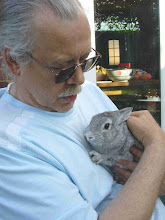
Sunday, May 24, 2009
Subscribe to:
Comments (Atom)
A relatively serious, but occasionally comic, view of events and issues I know something about.



Alcohol and me
Guess what! It's the drinking season again in Britain. For most this is OK. But for 10 - 15% of people, including me, the season of good will is period of sustained threat to our lives, sanity, family and friends. I call myself an alcoholic, despite not having had a drink over the past 12 months. Many don't like the term “alcoholic”. That's because they haven't been where I've been.
When the horrific depressions of my Bipolar illness first hit me hard in the 1970s, I turned to alcohol for self-medication. I had drunk since the age of 12 and I could “hold my liquor”. So it worked for a while. But I have an addictive personality (as do those other 10-15% of the population), and alcohol came to rule my life.
I tried everything to stop drinking – tranquillizers, dope, speed, Antabuse (a mushroom poison that makes you sick if you have alcohol), “self-control”, counselling, exercise, meditation, relaxation, “cold turkey” (DON'T DO THIS – you can die without medical help) and so on. Nothing worked, though I sometimes stayed dry for a few weeks or months after each depressive episode ended.
In the 1980s, I finally tried going to Alcoholics Anonymous (AA). The incident that triggered this is typical of those who reach out for AA's lifeline. I woke up in a filthy public toilet clutching an empty bottle of vodka, with no idea of how I had got there. Indeed, I could hardly remember anything at all. I was lucky to be alive, though I cursed the luck. This was a “rock bottom” experience, and sadly I had many more of them, and a lot of suicide attempts between then and now. The reason? I was an arrogant idiot, unable to face the truth no matter what happened.
But I started to go to AA meetings. After many years and many failed attempts to stay dry on my own, I finally realised that what AA was asking of me was humility. After all my failures to control my drinking, and all the other people I saw who failed equally, why did I think I was uniquely able to “control” the booze? I reached the 1st of the 12 steps of AA – I admitted that I was powerless over alcohol.
As a non-religious person, I was concerned about AA's use of the word God in some of its literature. The drunks who set up AA made it clear that, though AA is a spiritual programme, it does not support or oppose any sect, denomination or religion, or indeed atheism. The “higher power” of each AA member is respected. In my case, I chose the abstract idea of AA itself – a world-wide fellowship of men and women, meeting in crappy little rooms every day, all year round, willingly opening their hearts and minds to others. You can find a meeting in every major city and most towns in nearly every country. It's almost revolutionary.
Like most other people who view AA as their mainstay, I failed to stay sober quite a few times. I quit AA a few times, too. Bipolar really messes with my judgment, and I often forgot the simple AA reminder: “One drink is too many, twenty not enough.” Just don't have the first drink, one day at a time.
I've come back, again and again, and all in all I've been dry for half of the last 30 years. This isn't bad for a person who's been hospitalised for mania and depression a dozen times in the same period. I've learned that alcohol is no excuse for behaving badly and I have to accept full responsibility for the awful things I've done, whether remembered or not. AA has made me a bit more humble, and that's been a struggle.
A room full of AA people just looks like an ordinary gathering. There is a good deal of humour There's always tea and people asking “how are you?” but meaning it. Some have taken heroic spiritual journeys, but they don't stop there. The twelfth step of AA's programme involves offering support “to the alcoholic who still suffers” by phone or in person, so long as someone has expressed a desire to stop drinking. That “desire to stop drinking” is the only condition for AA membership; you don't have to talk at meetings or call yourself an alcoholic. AA isn't judgmental. It has no fees, and you don't need to be referred by anyone. Anything said in the meetings is utterly confidential, and no-one keeps records of membership.
I know that many people find other services suit them, and I'm glad. For me, however, the the daily torment of getting booze, keeping myself topped up and trying to deal with the aftermath of unremembered drunken actions and words was never going to be solved by courses or anti-anxiety techniques. AA has given me the freedom to drink or not to drink. A little hard-won wisdom has let me choose not to drink for the past year. I'm deeply grateful for each day, one day at a time.
For information on local meetings see www.alcoholics-anonymous.org.uk/
or phone the Helpline on 0845 769 7555.
Article not copyright, 2007